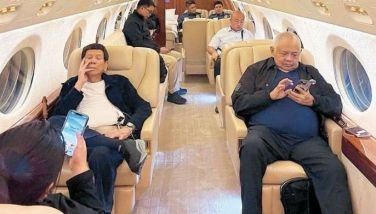Lucio Tan on how to fight inflation: Spend your money
June 8, 2003 | 12:00am
What can P270 million buy nowadays? A property at the posh Ayala Alabang, a top-of-the-line Volvo sedan, a condo unit at Fort-Bonifacio, a rest house sitting on a lush two-hectare lot in Batangas, and a few more millions to spare for life’s other amenities.
That’s the value of the P1 million in 1945 when the peso-dollar exchange rate was yet unheard of, and the country was still reeling from the devastation wrought by World War II.
This was the estimate of Dr. Lucio T. Tan on the worth of the peso – then and now. "Some people are asking me where they can deposit their money, in what currency and what bank? "I told them ‘spend your money you worked for and enjoy it.’"
The value of real estate property and the currency, Tan stressed, remains unstable and acquiring a lot today may not be a logical thing to do considering the strength of the peso against the dollar.
He described this as double bagsak, (double whammy), saying that if an individual acquired a land at P22 per square meter in the early 1980s, he cannot expect the value of his property to go up and earn a profit. "Suppose you have one dollar and the exchange rate was P22 for a dollar then, when you buy a one-square meter lot for P22 that P22 become P11 because of inflation and that P11 can no longer buy one dollar."
The computation of purchasing power of the peso is based on the consumer price index, a government indicator that shows price movements of goods and services nationwide.
Addressing the open forum of the 99th general assembly of FUSE (Foundation for Upgrading the Standard of Education), of which he is the vice-chairman, Tan said, "the logical thing to do is spend your money wisely considering the inflationary factors affecting our economy."
The businessman’s views hew closely with the recent move of Malacañang, particularly Tourism Secretary Richard Gordon, to move non-working holidays closer to weekends to perk up the economy. with extended holidays, the government believes, consumer expenditure would dramatically increase and more money would circulate in the economy.
"Even the local market is importing goods," Tan observed. "Agricultural products such as apples and oranges are cheaper than the locally-grown mangoes, lanzones and bananas."
Turning to the constraints faced by producers of confectionery products, Tan said some of the manufacturers in the country have established their factories in Thailand because the price of sugar there is much cheaper than the prevailing price of the commodity in the local market.
Figures show that along with the liberalization of investments, the country’s protective mechanism against unnecessary inflow of imports was reduced in the 1980s.
The first Tariff Reform Program in 1981-85 brought down tariff range to within 50 percent from highs of 100 percent tariff rates. The period of 1986-88 was considered as major import liberalization episodes where imports of more than 1,471 items were liberalized.
That’s the value of the P1 million in 1945 when the peso-dollar exchange rate was yet unheard of, and the country was still reeling from the devastation wrought by World War II.
This was the estimate of Dr. Lucio T. Tan on the worth of the peso – then and now. "Some people are asking me where they can deposit their money, in what currency and what bank? "I told them ‘spend your money you worked for and enjoy it.’"
The value of real estate property and the currency, Tan stressed, remains unstable and acquiring a lot today may not be a logical thing to do considering the strength of the peso against the dollar.
He described this as double bagsak, (double whammy), saying that if an individual acquired a land at P22 per square meter in the early 1980s, he cannot expect the value of his property to go up and earn a profit. "Suppose you have one dollar and the exchange rate was P22 for a dollar then, when you buy a one-square meter lot for P22 that P22 become P11 because of inflation and that P11 can no longer buy one dollar."
The computation of purchasing power of the peso is based on the consumer price index, a government indicator that shows price movements of goods and services nationwide.
Addressing the open forum of the 99th general assembly of FUSE (Foundation for Upgrading the Standard of Education), of which he is the vice-chairman, Tan said, "the logical thing to do is spend your money wisely considering the inflationary factors affecting our economy."
The businessman’s views hew closely with the recent move of Malacañang, particularly Tourism Secretary Richard Gordon, to move non-working holidays closer to weekends to perk up the economy. with extended holidays, the government believes, consumer expenditure would dramatically increase and more money would circulate in the economy.
"Even the local market is importing goods," Tan observed. "Agricultural products such as apples and oranges are cheaper than the locally-grown mangoes, lanzones and bananas."
Turning to the constraints faced by producers of confectionery products, Tan said some of the manufacturers in the country have established their factories in Thailand because the price of sugar there is much cheaper than the prevailing price of the commodity in the local market.
Figures show that along with the liberalization of investments, the country’s protective mechanism against unnecessary inflow of imports was reduced in the 1980s.
The first Tariff Reform Program in 1981-85 brought down tariff range to within 50 percent from highs of 100 percent tariff rates. The period of 1986-88 was considered as major import liberalization episodes where imports of more than 1,471 items were liberalized.
BrandSpace Articles
<
>
- Latest
- Trending
Trending
Latest
Trending
Latest
Recommended































